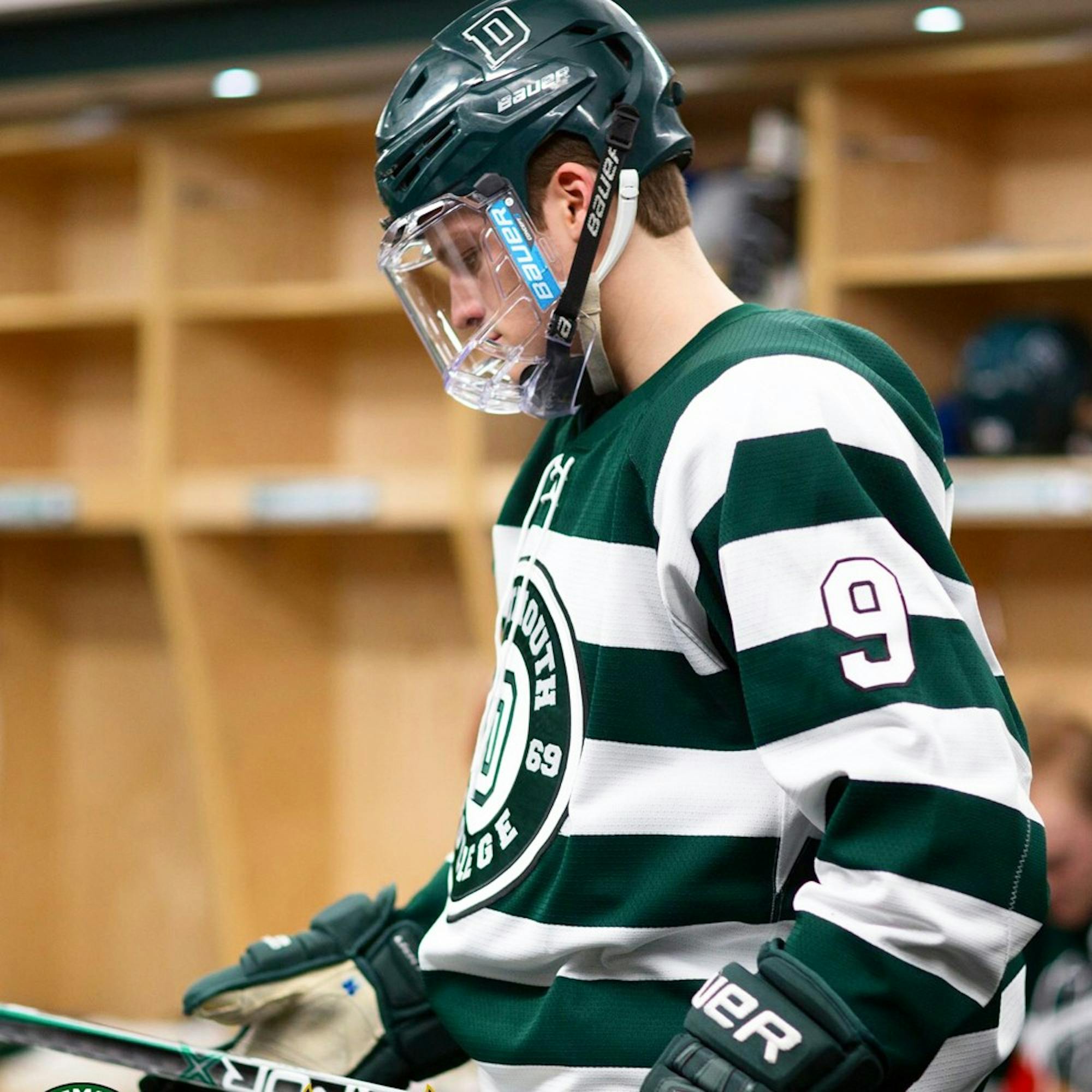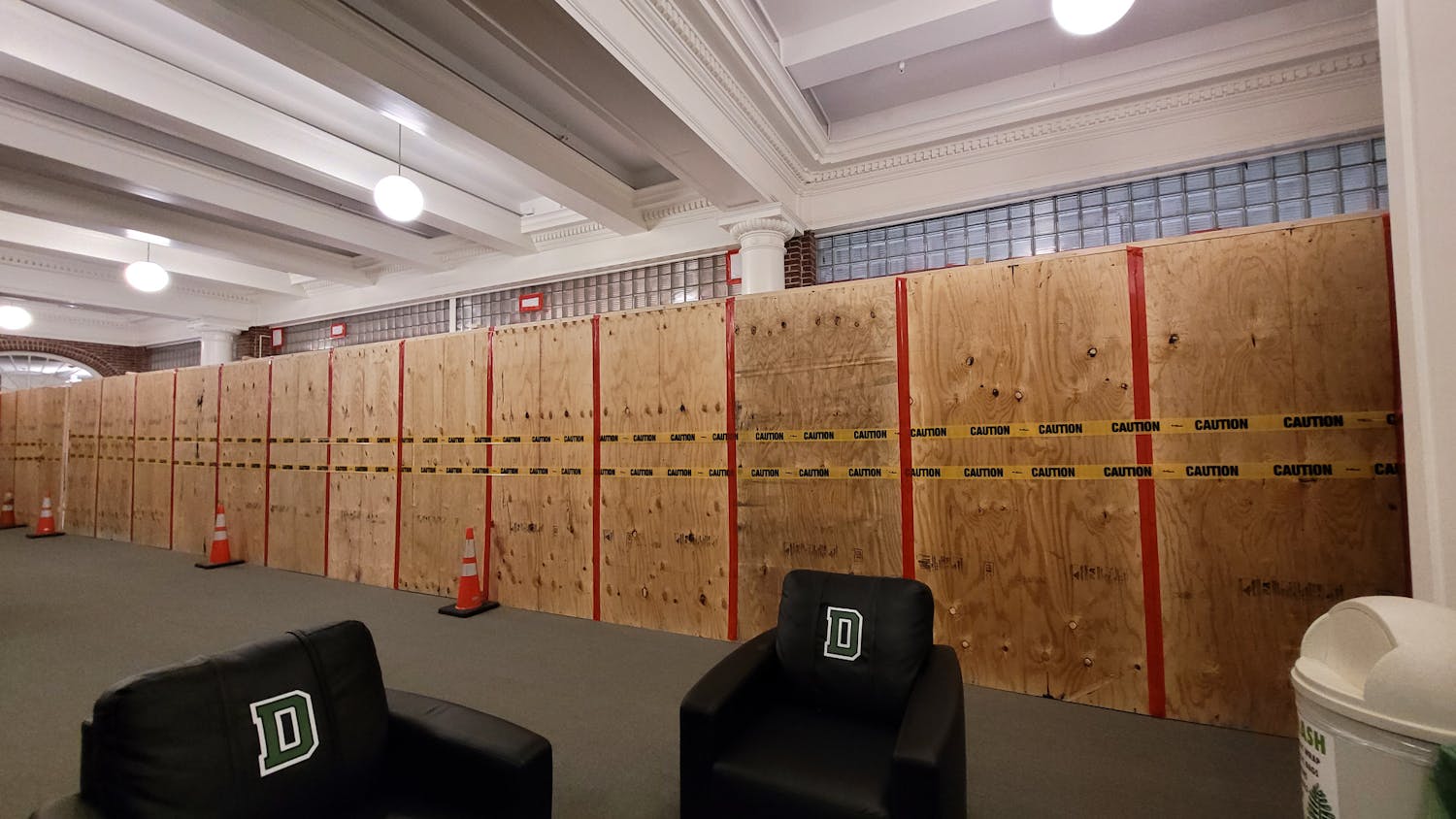We all heard it as kids — if at first you don’t succeed, try, try again. It’s a cliche that resonates with Troy Crema ’17.
“My father put me on skates when I was 3 and I actually hated it,” Crema said. “Believe it or not, I fell pretty hard on my backside the first time I ever went out there and decided that I did not want to skate again.”
But thanks to his father, Ken, and his newfound fascination with the game of hockey, Crema did not hang up his skates quite yet. With the North York Knights Under-6 team in need of new players, the 5-year-old Crema was enthusiastic about the opportunity to play youth hockey and asked his father to sign him up.
“My dad took me to [Toronto] Maple Leafs games frequently when I was little, and I remember being captivated by the pace of the game,” Crema added. “I credit my dad for most of my success because he was not just the first one to put me on skates, but he has always been a person I can go to for advice throughout my career.”
As his youth hockey career progressed, Crema was faced with a daunting decision that confronts most talented young hockey players in North America. As a 15-year-old with serious National Hockey League aspirations, Crema wanted to start on his road to the pros. Ultimately, he entered the Canadian Hockey League’s Ontario Hockey League, a typical stop for players on the way to the minors and the NHL.
The decision had a catch, however. The NCAA considers the CHL a professional league, as many CHL players receive player stipends and have already signed entry-level contracts with NHL teams. Any player who sets foot on the ice in a CHL game is thus ineligible to compete in NCAA competition. After being drafted by the OHL’s Saginaw Spirit in his minor midget year and performing well in camp, Crema’s professional dream seemed within closer reach than ever. An untimely spleen condition, however, would put the dream on hold and ultimately changed the course of Crema’s hockey career. He would have to bounce back.
Sixteen years old and undecided about his path back to the ice, Crema attended a tryout for the Brampton Capitals, a Junior “A” team participating in the Ontario Junior Hockey League. One of hundreds of players at the tryout, Crema made the team and quickly became the Capitals’ go-to center, recording 39 points in 48 games. It was also during this season that Crema first appeared on the radar of Eastern College Athletic Conference foes Harvard University, Yale University, Brown University and Cornell University, while also receiving attention from storied NCAA programs Notre Dame University and Pennsylvania State University. Ironically, Crema had yet to hear from Dartmouth. Intrigued by the possibility of playing at the highest level of collegiate hockey and pursuing a coveted degree at a top American university, Crema turned down Saginaw and began his journey to the NCAA ranks.
It was a journey, Crema now notes, with an unpromising beginning.
“I played at a prep school showcase in Boston a few weeks after my 16-year-old season ended,” Crema reflected with a laugh. “I was weeks out of my season, and I felt absolutely terrible out there.”
Heading into his 17-year-old season not yet committed to a college program, he got his break at a showcase in Mississauga, Ontario where he caught the eye of then-Dartmouth assistant coach Dave Peters.
“I remember my coach coming into the locker room after a game and telling me that a college coach wanted to speak with me,” Crema recalled. “I shook Coach Peters’ hand, heard his Boston accent, and he asked if I wanted to commit after I told him my grades and SAT scores. I knew that Dartmouth’s academics were outstanding, and the coaching staff was allowing me to come in as an 18-year-old when most NCAA freshman players are typically between 19 and 21. I still had NHL aspirations, so coming in young was a huge advantage.”
Crema’s Dartmouth career got off to an auspicious start, as the newcomer recorded his first goal in just his second collegiate game against Brown University. He made his biggest impact in a game at then-defending national champion Yale University, netting two tallies and helping the Big Green to a 4-1 victory. A high ankle sprain, however, would limit Crema’s total ice time during the season to just 14 games.
His second season in Hanover had a similar feel. After tweaking the same ankle in a preseason scrimmage, Crema missed the team’s first 16 games and saw action in just 12 contests overall. Despite recording just one goal and three assists in the limited action, Crema’s presence had a positive impact on the Big Green, which went 4-0-0 when the sophomore recorded a point. His presence did not go unnoticed by Dartmouth head coach Bob Gaudet ’81, who had high expectations for his third-year center, finally injury-free, as Crema’s junior season approached.
It was at this point that Crema began to make his mark on the Dartmouth score sheet, finishing fourth on the team with 19 points in 34 games. After moving to wing on a line with seniors Brad Schierhorn ’16 and Nick Bligh ’16, Crema got hot and enjoyed a three-game scoring stretch, playing a key role in ECAC playoff wins against Colgate University and Yale as the Big Green advanced to the ECAC semifinals. He also banged home one of Dartmouth’s biggest goals of the season, an overtime winner against Rensselaer Polytechnic Institute in February as the Big Green fought to secure fifth place in the ECAC standings.
The Toronto, Ontario native entered his final campaign more motivated than ever.
“I really wanted to build on the end of my junior season,” Crema noted. “I did two-a-day training sessions, working out in morning and skating in the afternoons, all summer long and tried to come back in the best shape possible. I wanted to be a leader on the team and somebody who the freshmen could look up to. My mentality was just to try my best, leave everything on the ice. With the help of my teammates, I had confidence that I could break out this season.”
And break out he did.
In the team’s first contest of the season, a 3-2 upset of then-No. 11 University of Michigan, Crema carved out a place in Dartmouth hockey lore. He tallied the game winner with 49 seconds to go before jumping into the boards and celebrating with his teammates in front of a sold-out crowd at Thompson Arena.
“I’ll never forget that goal,” Crema said. “We had been on the ice for a long shift and probably should have come off. As [Carl] Hesler [’18] made a great pass to Corey [Kalk ’18] cross-ice, I looked at the bench to see if I would come off, but decided to join the rush. Corey made a move in the zone and I just fired a low shot after the puck bounced to me.”
Crema developed a knack for scoring crucial goals all season. He led the Big Green with five game-winners, a total that was tied for seventh-best in the nation. But his contributions to this past season go beyond well-timed goals. Instead, he should be remembered as a player who did whatever it took for his team to win.
Another moment, less flashy than the Michigan goal but no less important, illustrates Crema’s impact on the team. On Jan. 28, with less than a minute to go in the second period against ECAC foe Cornell, Crema won a vital faceoff. That set up the Cam Roth ’19 goal that began the Big Green comeback. Dartmouth went on to a 4-2 victory over the then-No. 14 team in the nation.
Crema leaves Dartmouth as the program’s active leader in goals (27) and second to Grant Opperman ’17 in points with 59, having led the team with 29 points during his senior season. One of just three Dartmouth players to skate in all 31 games this season, he also leaves Hanover as a member of the All-Ivy League first team and all-ECAC third team.
It’s quite a resume for a kid who took a tumble his first time on skates. As Crema weighs professional hockey options following graduation in June, there is no doubt that his grit and ability to bounce back from obstacles will serve him well. And if at first he does not succeed, he will try … and try again.




